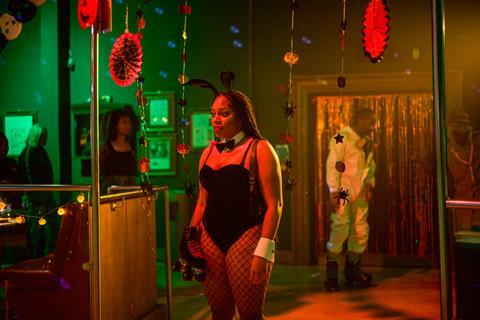
“Is Queenie the ‘black Bridget Jones’, as the author Candice Carty-Williams (on whose critically acclaimed bestseller the show is based) has called it? Hardly, even if at one point our heroine shows up to a party wrongly dressed as a bunny girl. But it may just be the black Fleabag. Dionne Brown is terrific in the lead role. Her Queenie is warm, likeable, one of those TV characters who arrives fully formed from the very first scene. Which is a good thing, given she is in 95 per cent of them.”
James Jackson, The Times
“Prickly and defensive, this heroine is less immediately lovable than Bridget Jones or Fanny Price. But she inspires the same need in us, a desire to see her sort out her emotions and fall in love — with the right man!”
Christopher Stevens, Daily Mail
“Queenie herself is quite beautifully rendered by Dionne Brown, in the kind of performance that you only ever find when an actor has fallen hook, line and sinker for their character. It makes an audience love a character too, and in a piece as centrally focussed as Queenie, that’s essential. Where Queenie stumbles is in its plotting. There is, inevitably in this post-Freudian age, an unspecified childhood trauma that lies beneath all of Queenie’s self-defeating decisions. While this may be psychologically credible, it’s also become the hoariest TV arc in the book.”
Benji Wilson, The Telegraph
“Showrunner Carty-Williams and her fellow screenwriters deftly balance these more serious storylines with lighter, comic moments, and Brown is a deeply empathetic screen presence: she brings pathos to Queenie’s mental health struggles without smoothing over her spiky sense of humour and her many foibles, backed up by a winning ensemble cast. Queenie is that rare thing: an adaptation that’s sure to be as beloved as the book that inspired it.”
Katie Rosseinsky, The Independent
“The way it is told – with dry humour and sexual frankness – feels a bit too familiar. What validates Queenie’s existence in the pantheon of TV’s flawed female leads is Brown’s star quality, Carty-Williams’ sharp observations and the show’s joyful love letter to south London. On screen, Queenie is as real as she was on the page.”
Rachel Sigee, The i
“Queenie feels like a dramedy dreamed up by half-arsed AI. The breakup, the queer pal who encourages her to date again, even the dreams of making it as a writer in the big city are painfully rote cliches. Because Queenie feels so imprecise, investing in any of these plotlines is difficult. It also becomes increasingly unclear who this show is trying to appeal to. Its depictions of Black womanhood are so basic that it is hard to imagine Black female audiences being impressed by its insights.”
Leila Latif, The Guardian
“Many of Star Wars’ best stories come when it strays from black and white storytelling, and – like Andor before it – The Acolyte thrives when it exists in the grey. The issue of who gets to control power and what that means for the Jedi, Sith, and everyone caught in between is thought-provoking and challenging. So far, The Acolyte is a couple of rungs below the best Star Wars live action series – Andor and The Mandalorian deserve that accolade – but it’s on the right trajectory.”
Amon Warmann, The i
“Praise must go to Showrunner Leslye Headland for trying to do something different with Star Wars, with the concept of a community of female dissidents accessing a forbidden side of the Force. Yet despite a reported $25m per episode budget, the series suffers from the same flat, ‘cheap’ look that was an issue with Obi-Wan Kenobi, while the pacy action scenes never compensate for the clunking dialogue. It’s a spirited effort, but in the continuum of Disney’s Star Wars hits and misses, The Acolyte lands bang in the middle.”
Ed Power, The Independent
“Ultimately, this is nostalgia sci-fi, a kids’ TV show aimed at 50 year olds who, in the UK, grew up in the days when Doctor Who-style adventure meant wobbly sets and creatures made out of polystyrene. The Acolyte has many times that production budget, but its heart, rather charmingly, is hewn from that awestruck past that had space as an endless adventure playground, not one long dark dystopia.”
Keith Watson, The Telegraph

